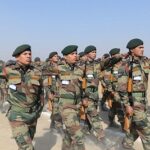The education and training of army leaders are fundamental to the operational effectiveness and strategic success of any military force. These leaders are the backbone of the army, guiding their troops through complex and challenging situations. This article delves into the comprehensive education and training programs designed to cultivate effective army leaders, the importance of these programs, and how they ensure preparedness and excellence in the field.

The Importance of Army Leadership Education
First and foremost, the importance of education and training for army leaders cannot be overstated. Effective leadership in the army is crucial for mission success, troop welfare, and maintaining high standards of discipline and professionalism. Therefore, investing in robust education and training programs ensures that leaders are well-prepared to handle the complexities of modern warfare and peacetime duties alike.
Foundational Training Programs
Basic Training and Officer Training School (OTS): All future army leaders begin their journey with foundational training programs. Basic training instills essential military skills and discipline, while Officer Training School (OTS) provides the initial leadership training necessary for commissioning as officers. These programs lay the groundwork for further leadership development.
Advanced Leadership Courses
Intermediate and Senior-Level Education: As army leaders progress in their careers, they attend intermediate and senior-level education courses. The Command and General Staff College (CGSC) and the Army War College (AWC) are prime examples of institutions that offer advanced leadership training. These courses focus on strategic thinking, operational planning, and the nuances of high-level command.
Specialized Training
Branch-Specific Schools: Transitioning to specialized training, army leaders often attend branch-specific schools tailored to their career fields. For instance, infantry officers may attend the Infantry School, while logistics officers might train at the Quartermaster School. This specialized training ensures that leaders possess in-depth knowledge and skills relevant to their specific roles.
Leadership Development Programs
Mentorship and Continuous Learning: Leadership development in the army extends beyond formal education. Mentorship programs pair junior officers with experienced leaders, fostering continuous learning and personal growth. Additionally, the army promotes lifelong learning through online courses, workshops, and seminars, ensuring leaders stay updated with the latest tactics, technologies, and leadership practices.
The Role of Experience
On-the-Job Training and Field Exercises: Furthermore, practical experience is a critical component of army leadership training. On-the-job training and field exercises simulate real-world scenarios, allowing leaders to apply their knowledge in practice. These experiences are invaluable for honing decision-making skills, resilience, and adaptability under pressure.
Technological Integration in Training
Simulation and Virtual Training: With the advent of modern technology, the army has integrated advanced simulation and virtual training tools into its programs. These technologies provide realistic and immersive training environments, enhancing the preparedness of army leaders without the risks associated with live exercises.
Leadership Qualities and Skills
Essential Attributes for Army Leaders: Effective army leaders must possess a range of essential attributes and skills. These include:
Decision-Making Abilities: Making sound decisions quickly under pressure.
Communication Skills: Clearly conveying orders and information.
Integrity and Ethical Conduct: Upholding the highest standards of moral behavior.
Physical and Mental Resilience: Enduring the physical and psychological demands of military service.
Strategic Vision: Understanding and implementing broader strategic objectives.
Continuous Assessment and Improvement
Performance Evaluations: The army employs rigorous performance evaluations to assess and improve the capabilities of its leaders. Regular feedback and assessments help identify areas for development, ensuring that leaders continually strive for excellence.



Conclusion
In conclusion, the education and training of army leaders are comprehensive and multifaceted, encompassing foundational training, advanced courses, specialized programs, practical experience, and continuous learning. These programs are essential for developing leaders who can effectively command and inspire their troops, ensuring the success and integrity of the army.
FAQs
Q. Why is the education and training of army leaders important?
Ans. It ensures leaders are prepared to handle complex military operations and maintain high standards of discipline and professionalism.
Q. What are the key components of army leadership training?
Ans. Key components include foundational training, advanced leadership courses, specialized branch-specific training, and practical on-the-job experience.
Q. How does the army integrate technology into leadership training?
Ans. The army uses advanced simulation and virtual training tools to provide realistic and immersive training environments.
By understanding the critical role of education and training in developing army leaders, we can appreciate the meticulous efforts that go into preparing these individuals to lead with excellence and integrity.
Download Target Defence Academy Mobile App
The Importance of Respect in Armed Forces






